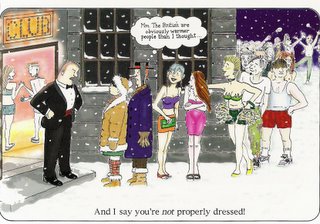First Prize in the Lottery of Life?

Due to the protracted distractions of multiple visitors, coupled with persistent flu-like symptoms which I'm still hoping are not of the avian-induced variety, the R.A. has been on an unforeseen temporary hiatus.
Fortunately, the material for this week's post more or less delivered itself to my computer screen in the form of some lively ripostes regarding my blog on a thoroughly entertaining British expat forum. Many of the postings demonstrated more about that infamous British "sense of humor" than I could ever hope to articulate myself, so I thought I'd share some of those here.
BritGuyTN: "Did anyone else notive [sic] that this silly tart complained about paying for sewage? is london the only place she has been apart from new york?... another candidate for needing a helmet before leaving the house."
RA: This is the second time I've had the humorous distinction of being called a tart (BritSpeak for promiscuous person), which I have to say is a rather curious choice of insult to hurl at a complete stranger in cyberspace. The previous time was at a cocktail bar when an unseemly drunk man launched himself on me at the coat check and his equally inebriated girlfriend slurred this invective before making a beeline to get sick on the sidewalk. I must admit, it does makes me feel like I've really arrived here, sort of like in the fourth grade at Irving Elementary when Latrelle Jackson would bestow the name 'honky' on only the people he secretly admired.
Rushman: "I was taking it all with a pinch of salt until the stupid [bleep] started knocking the East End. For her information, the "Angel" tube station is not in the East End. It's in [bleeping] Islington...NORTH LONDON. Just the self important ramblings of another American with a crap sense of tradition, history and geography and importantly, a complete stereotypical lack of understanding another culture."
RA: And to think before now I thought we New Yorkers held the torch for being defensive and self-righteous...clearly, it's time to pass the baton.
AntJen: "Sounds like she has already picked up 1 british habit she doesnt realise - moaning about something and not doing anything about it."
RA: Well, short of making like a Brit and just stabbing everyone that annoys me or alternatively drowning my troubles in drink, I opt to use my blog for a therapeutic outlet. Certainly if I could wave a magic wand to single-handedly improve the quality level of things over here and implant a motivation gene in the large percentage of the population that lacks one, I wouldn't hesitate.
While the English are certainly notorious for 'whingeing' amongst themselves, in other parts of the world, people actually complain straight to the source (i.e. the government, the transportation authority, the store manager, the landlord) and this is the impetus for much improvement and innovation. (As a personal aside, I think you'd be amazed how easy it is for foreigners such as myself to get action over here in the Land of Inaction, simply by speaking up and not being satisfied with "it's not possible" or "sometime next month" for an answer.)
Neil: "And how can she be so critical of the tube, when the New York subway is infinitely worse - at least in the tube you have computerised signs telling you when the next train is coming (in NY it can be difficult to know if you're standing on the right platform); and you have an easy to read map; and you can get from one side of town to the other without having to go uptown on one train to then get another one to take you downtown again."
RA: This could be the subject of many a blog in and of itself--suffice it to say that while we don't have fancy computerised screens in NY telling us when the next train is coming, that's generally because our trains actually do RUN so such a system would be an egregious waste of the money that's better spent on maintenance and new subway cars. I think I can speak for most New Yorkers when I say we'd rather be on the move than standing around watching a computer screen tell us when we might be moving.
Things have actually gotten so dire here recently that they've started making Tube announcements letting passengers know when there is "good service" on the trains, as opposed to the old announcements telling us when there's a disruption. No doubt some savvy soul in the head office clued-in to the time (and voice) saving practicalities of this strategy.
BigDavyG: "Its a bit rich that she complains about public traansport [sic] and she seems to be paying $500 for her tv license - looks like someone has her figured for being one of those "dumb americans".
RA: Let's see, I'm not sure what riding public transport and paying for a TV licence have in common, unless you're honestly theorizing that I'm so rich that I actually pay the mandatory TV licence so why should I be stooping to ride public transport?! I don't even know where to go with that one. And yes, of course everyone here knows not paying for the TV licence is only a problem if you get caught--just like shoplifting or illegal cable hookups in the States--but the fact is, it does happen to be the law (and not even one that I agree with), which it appears you're advocating we spendthrift Americans should be breaking.
If, as Cecil Rhodes once observed, "To be born English is to win the first prize in the lottery of life", I think I might do best to pass up this year's lotto jackpot and squander my savings at the craps table.


















